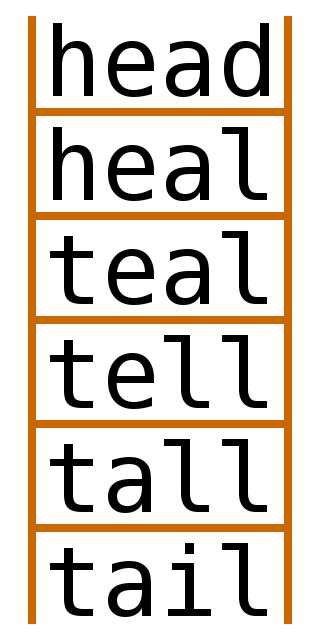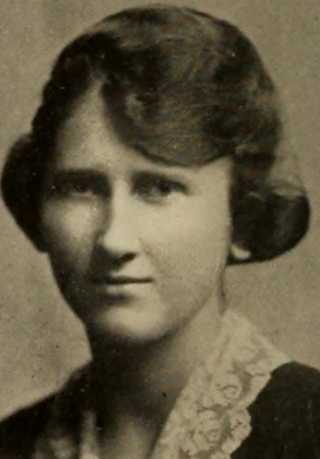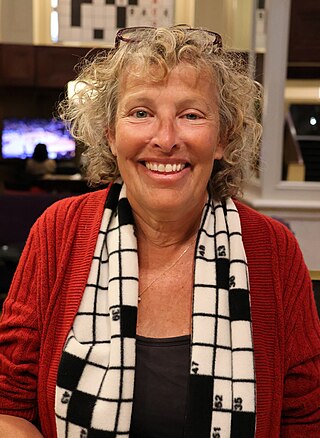
Scrabble is a word game in which two to four players score points by placing tiles, each bearing a single letter, onto a game board divided into a 15×15 grid of squares. The tiles must form words that, in crossword fashion, read left to right in rows or downward in columns and are included in a standard dictionary or lexicon.
Word games are spoken, board, card or video games often designed to test ability with language or to explore its properties.

A crossword is a word game consisting of a grid of black and white squares, into which solvers enter words or phrases ("entries") crossing each other horizontally ("across") and vertically ("down") according to a set of clues. Each white square is typically filled with one letter, while the black squares are used to separate entries. The first white square in each entry is typically numbered to correspond to its clue.

A cryptic crossword is a crossword puzzle in which each clue is a word puzzle. Cryptic crosswords are particularly popular in the United Kingdom, where they originated, as well as Ireland, Israel, the Netherlands, and in several Commonwealth nations, including Australia, Canada, India, Kenya, Malta, New Zealand, and South Africa. Compilers of cryptic crosswords are commonly called setters in the UK and constructors in the US. Particularly in the UK, a distinction may be made between cryptics and quick crosswords, and sometimes two sets of clues are given for a single puzzle grid.

William F. Shortz is an American puzzle creator and editor who is the crossword editor for The New York Times. He graduated from Indiana University with a degree in the invented field of enigmatology. After starting his career at Penny Press and Games magazine, he was hired by The New York Times in 1993. Shortz's American Crossword Puzzle Tournament is the country's oldest and largest crossword tournament.

At The Carnival is a puzzle video game by Cliff Johnson published in 1989 by Miles Computing.

Word ladder is a word game invented by Lewis Carroll. A word ladder puzzle begins with two words, and to solve the puzzle one must find a chain of other words to link the two, in which two adjacent words differ by one letter.

Crosswords DS is a puzzle video game developed by American studio Nuevo Retro games released by Nintendo for the Nintendo DS handheld video game console. It was previously released in Australia as CrossworDS but a new OFLC entry confirmed that Nintendo Australia re-released it with a European localization. Crosswords DS features over 1,000 crossword puzzles that the player solves by using the stylus. Despite the title, it also features word search puzzles and anagram puzzles. It makes use of similar handwriting mechanics that the Brain Age titles make use of. Crosswords DS is included in the Touch! Generations series of titles, which includes such popular games as Brain Age: Train Your Brain in Minutes a Day! and Nintendogs. The background music was composed by Fabian Del Priore.
Scribbage is a classic dice word game published in 1959 by the E.S. Lowe Company. 13 dice are rolled which have various letters on each side. Each letter is given a point value depending on its frequency in the English language. A timer is flipped and the player has to put the dice into words either left-to-right or up-and-down. The words must connect with each other as in crossword puzzles or Scrabble. The player must stop at the end of the time and points are counted. The player adds up the points of the letters used and subtracts the amount from the unused letters. Scribbage can be played with two or more players.

The New York Times Crossword is a daily American-style crossword puzzle published in The New York Times as part of The New York Times Games, online on the newspaper's website, syndicated to more than 300 other newspapers and journals, and on mobile apps.
Crosswordese is the group of words frequently found in US crossword puzzles but seldom found in everyday conversation. The words are usually short, three to five letters, with letter combinations which crossword constructors find useful in the creation of crossword puzzles, such as words that start and/or end with vowels, abbreviations consisting entirely of consonants, unusual combinations of letters, and words consisting almost entirely of frequently used letters. Such words are needed in almost every puzzle to some extent. Too much crosswordese in a crossword puzzle is frowned upon by crossword-makers and crossword enthusiasts.

Margaret Petherbridge Farrar was an American journalist and the first crossword puzzle editor for The New York Times (1942–1968). Creator of many of the rules of modern crossword design, she compiled and edited a long-running series of crossword puzzle books – including the first book of any kind that Simon & Schuster published (1924). She was considered "the grand dame of the American crossword puzzle."

Merl Harry Reagle was an American crossword constructor. For 30 years, he constructed a puzzle every Sunday for the San Francisco Chronicle, which he syndicated to more than 50 Sunday newspapers, including the Washington Post, the Los Angeles Times, the Philadelphia Inquirer, the Seattle Times, The Plain Dealer, the Hartford Courant, the New York Observer, and the Arizona Daily Star. Reagle also produced crossword puzzles for AARP: The Magazine and the American Crossword Puzzle Tournament.

Lexicon is a word game using a dedicated deck of cards for 2 to 4 players published as a shedding card game.

Microsoft Ultimate Word Games is a word puzzle game published by Microsoft Studios, first released for Windows Phone as 'Wordament' on April 24, 2012. The game was relaunched in June 2017 with two new game modes, Crosswords and Word Twister.

People Puzzler is an American television game show hosted by Leah Remini and broadcast by Game Show Network. It premiered on January 18, 2021. The show is inspired by the celebrity and pop-culture themed crosswords in People magazine.

The New York TimesSpelling Bee, or simply the Spelling Bee, is a word game distributed in print and electronic format by The New York Times as part of The New York Times Games. Created by Frank Longo, the game debuted in a weekly print format in 2014. A digital daily version with an altered scoring system launched on May 9, 2018.
Wordle is a web-based word game created and developed by Welsh software engineer Josh Wardle. Players have six attempts to guess a five-letter word, with feedback given for each guess in the form of colored tiles indicating when letters match or occupy the correct position. The mechanics are similar to the 1955 pen-and-paper game Jotto and the television game show franchise Lingo. Wordle has a single daily solution, with all players attempting to guess the same word.

Andrea Carla Michaels is an American crossword puzzle constructor and corporate naming consultant. She was a comedian and television writer after graduating from Harvard University in 1980 and has played competitive chess and Scrabble and appeared on Jeopardy! and Wheel of Fortune. More than 80 crosswords by her have been published in The New York Times since 2000. In San Francisco, she has become known as the "Pizza Lady" for her efforts to feed homeless people in her community.

The New York Times Games is a collection of casual print and online games published by The New York Times, an American newspaper. Originated with the crossword in 1942, NYT Games was officially established on August 21, 2014, with the addition of the Mini Crossword. Most puzzles of The New York Times Games are published and refreshed daily, mirroring The Times' daily newspaper cadence.

















